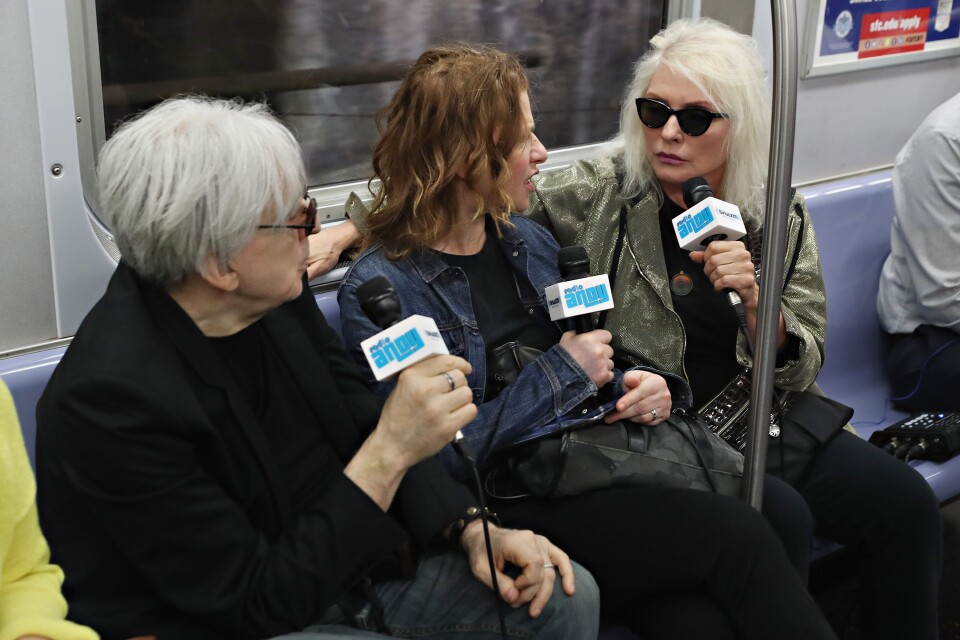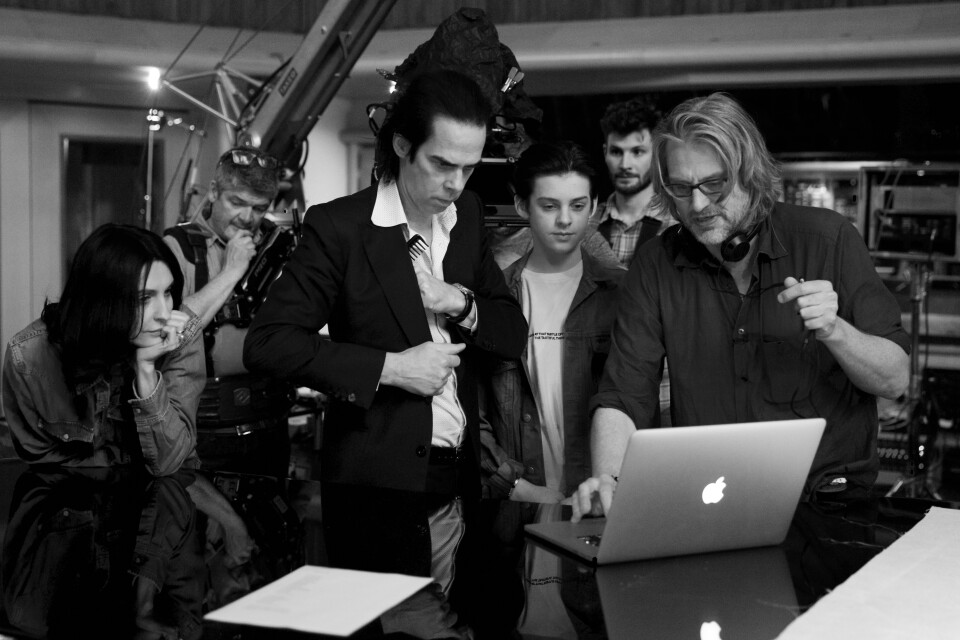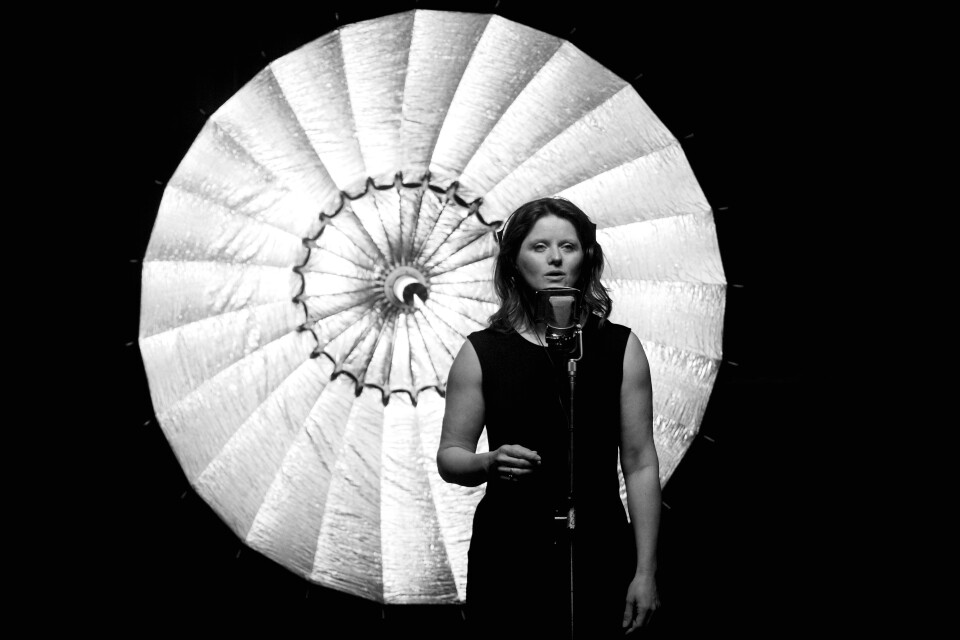After Nick Cave's son died in a tragic accident, he asked filmmaker Andrew Dominik to document the recording of his next album. The result: the haunting documentary, “One More Time With Feeling"; Emilie Friedlander of Vice Media says the fire-ravaged warehouse in Oakland that was home to artists is not a rarity; Sandra Bernhard on blending comedy, music and commentary in her new cabaret-style stage show.
Sandra Bernhard crosses uncomfortable borders on stage and on 'Sandyland'
Sandra Bernhard is best known for her five-season stint on "Roseanne" as Nancy Bartlett, but her heart is in live performance. Her cabaret-style stage shows are a blend of comedy, music and pop culture commentary. They draw crowds of devoted fans, but Bernhard told KPCC that a recent foray into satellite radio has expanded her reach.
All kinds of people have started to listen to me, surprising people. People have called in from South Carolina, from Arkansas — you know, around the country, and that always takes me by surprise.
Bernhard's SiriusXM show "Sandyland" is a live show on Andy Cohen's channel Radio Andy. She takes calls from listeners, interviews guests like Debbie Harry and Lena Dunham and delivers plenty of on-air commentary in her signature style.

The Frame's John Horn spoke with Bernhard about hosting live radio, as well as her new stage show "Sandra Monica Blvd: Coast to Coast," which is set to debut in Los Angeles at The Wallis Annenberg Center for The Performing Arts on Dec. 8-10.
INTERVIEW HIGHLIGHTS
On her diverse radio audience:
They're not always necessarily a hundred percent on my super, uber-liberal wavelength. And yet, they're people who want the best for themselves, for the world, for their families. And I think that the great thing about being a performer, being an entertainer, is being inquisitive... I think there are certain people who have the ability to kind of reach across unexpected lines and get to know people.
On playing a bisexual woman on "Roseanne":
It was never done with some big heavy political point of view. It was just done because it was fun and nobody had ever done it before. She was a kooky character and she kind of fit in with all of the characters on "Roseanne." I think it just established me as [a] fun, television personality actress person. I think the impact of playing that role came later. I mean, nobody was patting themselves on the back thinking they were breaking any ground. They just thought, Oh, this is a really fun way of approaching a character.
Why you should see her one-woman show:
They'll never see anybody like me. I mean there's so few people that combine and synthesize comedy, and music, and rock and roll. It's a big mixed bag of fun and crazy. I try to get people to look at themselves, and I look at myself, and we all are the better for it.
Sandra Bernhard's newest show, "Sandra Monica Blvd: Coast to Coast," is at the Wallis in Beverly Hills Dec. 8-10. To get more stories and interviews like this subscribe to The Frame podcast on iTunes.
What will happen to LA's underground music scene after Oakland warehouse fire?
The fire that broke out Friday at an Oakland building known as Ghost Ship has claimed at least 36 lives; that number is sadly expected to rise.
The tragedy has shaken not only Oakland’s underground music community, but also an entire nation of artists and their fans.
One of the acts scheduled to perform at the Oakland venue was signed to 100% Silk, an L.A.-based label specializing in underground house and experimental noise music. The label has reported that some of its artists are still missing.
In order to understand how this tragedy might increase restrictions on L.A.’s own do-it-yourself venues, we reached out to
this morning. She’s editor-in-chief of
hump. That’s the electronic music and culture channel from Vice Media, and she's also the co-founder of AdHoc, a Brooklyn-based events collective.
When she spoke with The Frame's host, John Horn, Friedlander said the L.A. underground music scene is "very large and very active." She explained that even above-ground venues struggle to keep up with the costs of attaining permits, and that underground venues are by their very nature fleeting.
Like in all cities, the warehouse scene and the D-I-Y scene in general is kind of a moving target. Places open up and become really special to their communities for a couple of years and then they're inevitably forced to shutter.
In light of the tragedy in Oakland, Friedlander fears that local governments may take a hard-line approach to managing underground venues. In Los Angeles, one city councilman is asking for the public's help in reporting illegally-converted buildings. But Friedlander hopes that cities don't issue a blanket crackdown on such spaces.
The cities could acknowledge that these places are an inevitability and will always continue to operate, no matter what, and take a different approach to having more dialogue with [residents], letting them know what the regulations are and helping them to find more cost affordable ways to get up to code.
Nick Cave doc 'One More Time With Feeling' is a touching portrait of grief and creativity
In July of last year, musician Nick Cave and his wife Susie suffered a terrible tragedy.
One of their twin 15-year-old sons, Arthur, fell off a cliff to his death near their home in Brighton, England after taking LSD.
Several months after Arthur’s death – and still deep in the grieving process – Cave approached his friend, movie director Andrew Dominik, with the idea to film the recording of his latest album, "Skeleton Tree." It’s Cave’s 16th album with his band, The Bad Seeds.
The result is the documentary, "One More Time With Feeling." Shot in black-and-white and in 3D, the movie follows Cave and his songwriting partner, Warren Ellis, as they lay down tracks and work through compositions. Also captured on screen are moments between recordings as Cave, his band and his family cope in the wake of the tragedy.
When Dominik recently stopped by The Frame, he started by explaining how he approached such a sensitive topic.
Interview Highlights:
On how he balanced talking about the death of Cave's son as a friend and as a filmmaker:
It was difficult because even the subject of Arthur was not something that we could talk about easily in our friendship. I remember talking about him just the day after the funeral and asking him how he felt about talking about it. He said, I feel fine. But any time you tried to address that topic, the subject would change immediately.
I realized, basically toward the end of the shoot, that Nick did feel that he had things to say about Arthur dying. I think he realized that, as a public figure, there was no way he was going to be able to avoid talking about it. And he also told me that all the books say that grief is kind of a solo show. You go through it by yourself. But in his experience, and in the experience of Susie and [surviving twin] Earl, they had found the massive outpouring of support really helpful. And he felt that he did want to let people who cared know how he was. And the film was an opportunity for him to directly address that.
But there was a constant anxiety that the film itself would somehow be repulsive, that we were going to be using a tragedy to sell records — grief porn. Even the idea of doing it, there was something off about it. There was something that was a constant worry. The main worry was for Nick that he would somehow dishonor his son or he would do Arthur some form of disservice by making the film.

On negotiating moments Cave might not have wanted to share:
It's a constant back-and-forth. We're always talking about how there's a line somewhere between where it's valid and has integrity as a portrait of people in this situation, and where — on the other side of the line — it's grief porn. But we never really knew where that line was. As a filmmaker, I'm asking Nick things that I would never ask him as a friend, but I think he wanted me there as a filmmaker. He wanted to make a good film. And to make a good film it has to come to grips with what's happened. Even if you don't want to come to grips with what happened, there's no way to avoid it because it's really the only subject.

On what he discovered about Cave and about grief through the making of this film:
I think for Nick, who's someone who has always brought meaning to his life through fiction — like something happens to him, it's a chaotic random universe and he constructs a story around it and that gives the event meaning — I think in this situation, it didn't work. He went into the studio expecting to be able to encase arms around this trauma and found himself unable to do it. For Susie it was kind of the opposite. She found a kind of courage I guess in her creative expression because it wasn't important. That was the amazing thing about making this film: it wasn't important. All of the things that you worry about like, Is the film going to be good? Is the record going to be good? Is this relevant? All of that stuff just kind of pales into insignificance when you're dealing with something like that.
Was that liberating in a way?
Yeah. And the other thing I found incredibly liberating was going to work and having no idea what I was going to do. The movie is completely improvised. And also not being the primary creative entity. Do you know what I mean? The film is a secondary intrusion on the main creative thing [that] is going on, which is making the record. I'm just sort of standing there with a butterfly net trying to grab these moments as they fly by. That was incredibly liberating.

On how Cave's approach to making music parallels his moviemaking style:
Nick has the luxury of being able to throw a song out if it doesn't work. The way that they approach this is really amazing. Sometimes the first time Nick's hearing the music for a song is actually when he's singing the vocal over the top of it. He'll just walk into the vocal booth, Warren will put some music up, and Nick stands there with his book of lyrics and just grabs stuff on the fly. He's obsessed with that. He feels like when he's put into a state where he doesn't know what's going on, his instinct, his unconscious is working and something very interesting and primal is happening. If that doesn't work, he can just throw the song out, whereas if you're making a movie, you can't get away with just throwing away certain scenes. That would just be wonderful. But I think every endeavor is the same. The same processes are involved in it.

On how Cave and his wife chose to be happy in spite of their sadness:
I think that's incredibly healthy that they basically take the joy where they can find it. The other thing I'd like to say is that I think the film is filled with love. I think that you see the gratitude that they all have for each other. It's not unrelenting darkness. It's pain, but the pain is not something they want to be without, because the pain is the flip-side of the love that they feel. I imagine I would be very disturbed to lose that pain. But on the other hand, if they're having a good day, they're not going to look a gift-horse in the mouth.

On Cave's level of editorial control:
We had a deal and the deal was I could ask him anything, I could shoot anything and he could cut anything out of the film that he wanted to cut out. Now, when he saw the film, he basically felt uncomfortable with any of the interview stuff of him in the kitchen — any of the stuff where he's talking directly about Arthur's death. He just felt that stuff was a guy waffling on. And Susie didn't like any of the stuff with her. But Nick liked Susie and Susie liked Nick. So they gave it to Warren and Warren said, It's great. Don't touch it. So Nick didn't exercise his right to control the film. And I think part of the reason for doing the film is so he doesn't have to be here. It's me. If I'm going to be here and take responsibility for it, then I need to be able to accept responsibility, so he's not going to exercise authority or control. But I will say, he really didn't like the cliff.
On keeping the final shot of the cliff where Arthur fell to his death:
That was something that he had a visceral reaction to. So basically, I said, Okay, I'll cut it out. But [the film] wasn't as good. I showed it to him a week later and he was able to see it again. The thing about the cliff is, when I first heard that Arthur died, the thing I imagined was the cliff itself. On the day after the funeral, Susie took us to the cliff. The cliff was beautiful. You stood at the top of the cliff and you could see the sea and the sky. There was something about that image that expressed a kind of continuum. You're humbled before that. I thought it was an opportunity to take something that had a very traumatic association and to enable you to shrink it down and show you that there's something beautiful there.




